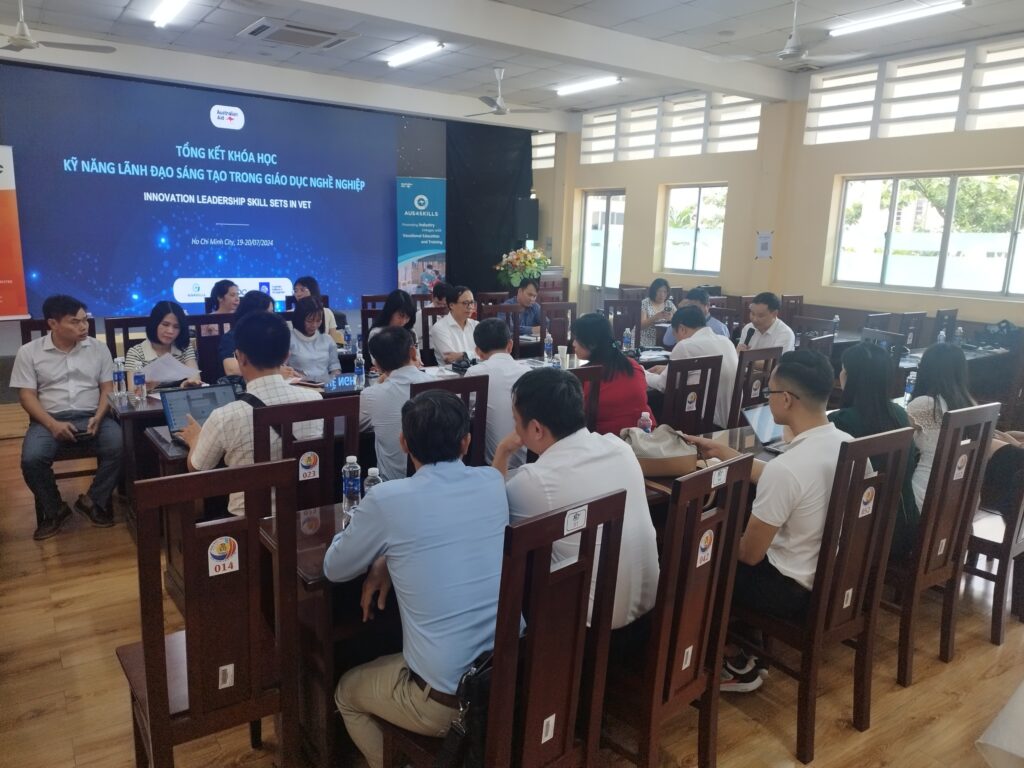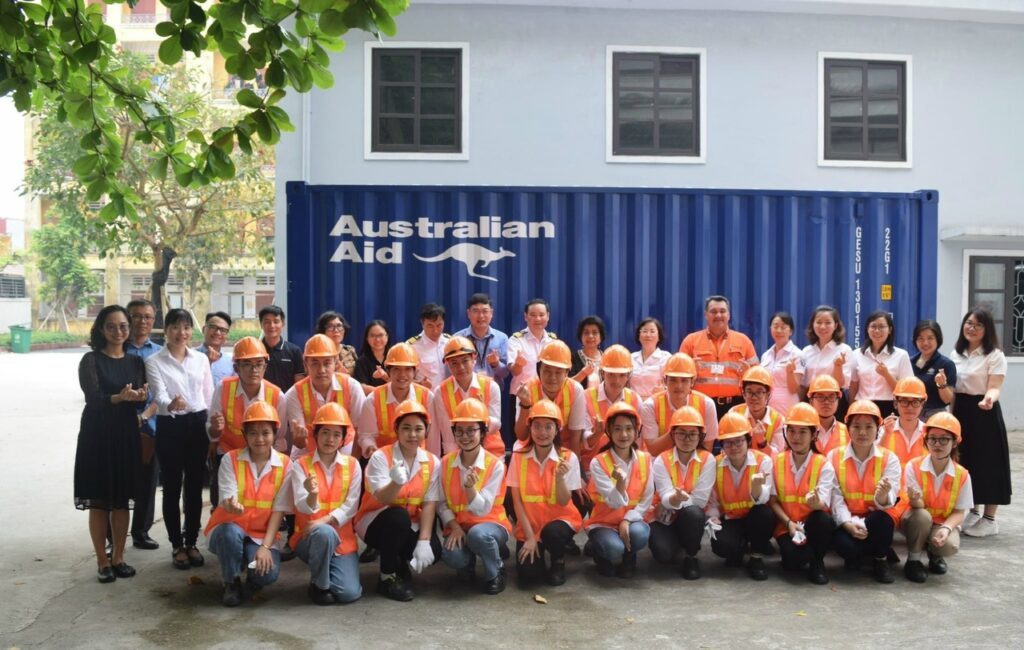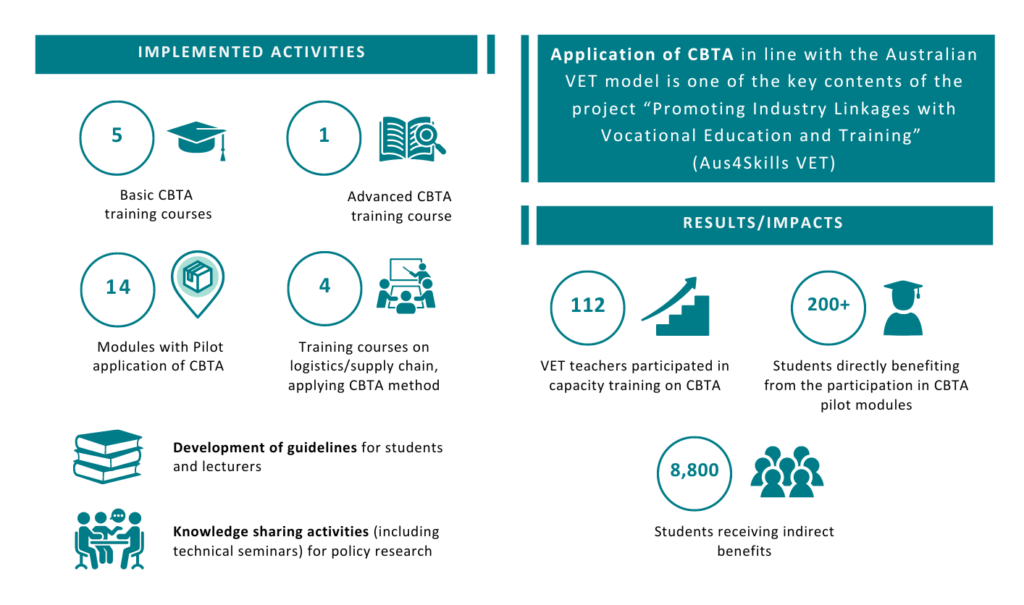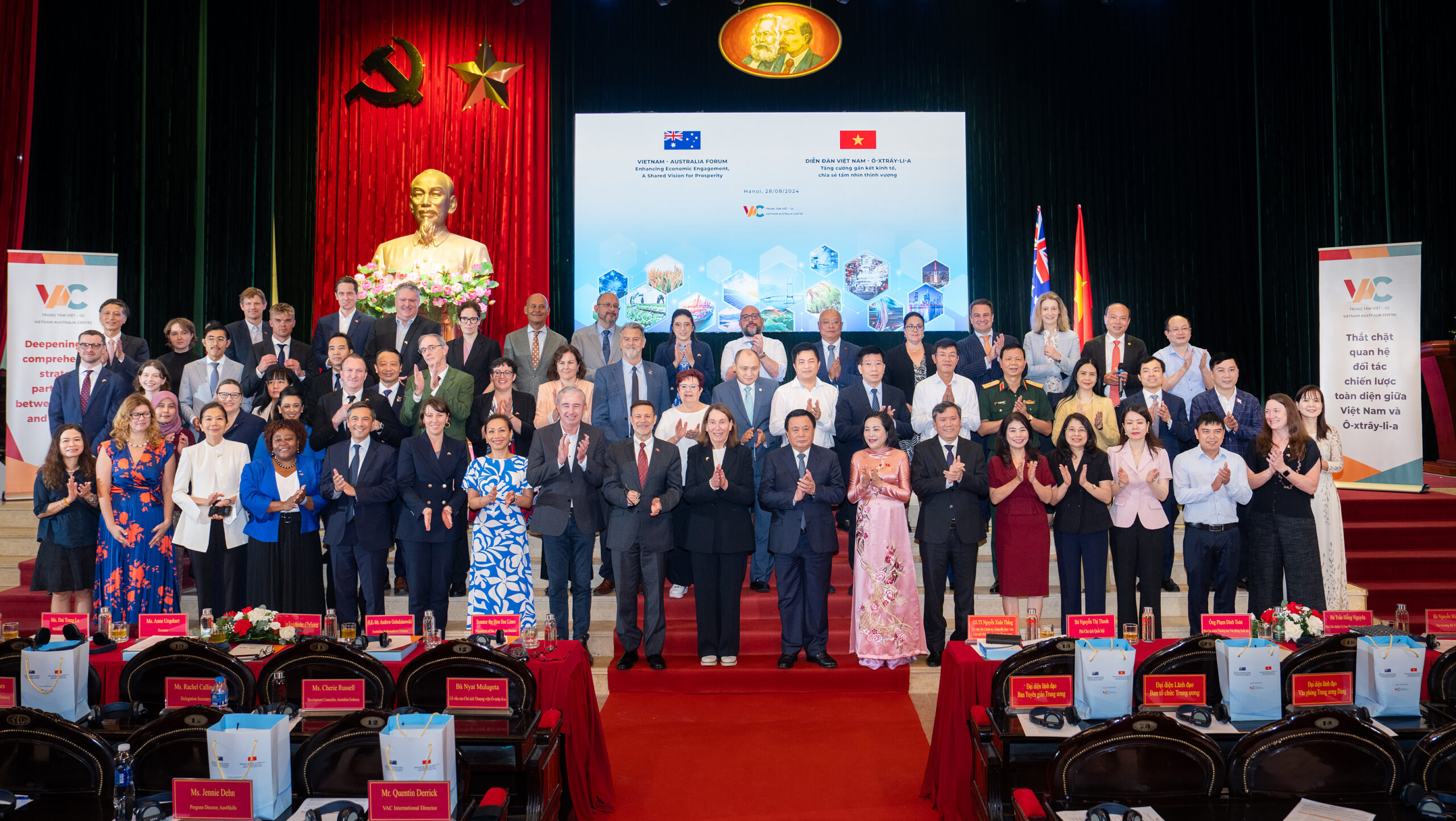In vocational education and training (VET) in Vietnam, the innovation in training and assessment methods plays a key role in improving teaching quality and meeting the actual requirements of the labour market. Australia is working with Vietnam to promote the application of the Competency-Based Training and Assessment (CBTA) model from Australia at VET colleges, to ensure graduates have enough skills and confidence to enter the labour market right after graduation.
On July 19, 2024, at the Ho Chi Minh City College of Transport, leaders of 16 VET colleges participating in the Project “Promoting Logistics industry linkages with vocational education and training” joined the Aus4Skills Program to organise a dialogue on CBTA. The dialogue was attended by leadership representatives from all 16 VET partner colleges, representatives of the Aus4Skills Program, the Directorate of Vocational Education and Training (DVET) and 23 participants of the Australian Awards Short Course on Innovation Leadership Skill Sets in VET.
Importance of Australia’s CBTA model and its application in Vietnam
Delivering her opening remarks at the dialogue, Ms. Jennie Dehn – Aus4Skills Program Director emphasised: “We do not wait until the end of the Project to share results and lessons learned. Therefore, the Aus4Skills Program organises a dialogue between leaders of VET colleges to enhance learning and support each other, thereby replicating the Project’s results”.
At the event, she also gave a presentation about the training package and CBTA approach, a typical feature of Australian vocational education and training. This approach not only helps ensure training quality but also ensures the openness and flexibility of the VET system and effective use of resources. Regarding the application of CBTA in VET in Vietnam, Dr. Ha Duc Ngoc – representative from the DVET Department of Formal Training shared: “The two newly issued circulars on learning outcomes and VET programs have updated some regulations based on the reference to the CBTA approach of Australia. Therefore, VET colleges need to consider applying CBTA at the training-program level rather than just limit its application in some modules”.

CBTA is a learner-centred method with a focus on their ability to acquire vocational competencies
Challenges and opportunities in applying CBTA
Based on the two speeches, a discussion between VET college leaders took place under the facilitation of Dr. Luu Viet Hung – Rector of Maritime College No. 1 and the support of Mr. Phan Huy Duc – Vice Rector of Ho Chi Minh City College of Transport.

Participants triggering valuable exchanges in the dialogue
The discussion shows that VET colleges participating in the Project are applying CBTA in different ways to improve training programs, including developing projects, making thematic resolutions on renovating training packages, as well as piloting the CBTA method in key faculties. At Vien Dong Vocational College, Vice Rector Phan Thi Le Thu said that the school was very flexible in developing programs and modules based on the CBTA approach, ensuring the program contents meet the requirements of each specific job in the workplace. Ms. Thu also shared that Vien Dong Vocational College not only sent students to businesses for their internships with accompanying teachers, but also invited businesses to come to the school to share with students.
However, the application of CBTA still faces many challenges. The revision and development of the entire training program based on CBTA requires a large amount of funding. Meanwhile, currently, only a few logistics educators are trained in this method. In addition, the ability of some lecturers to integrate theory and practice remains limited. Mr. Ho Viet Ha, rector of Da Nang Vocational Training College, also pointed out difficulties in the learning outcomes of some programs. For instance, the minimum number of learning hours is still too high, while CBTA focuses on competency rather than the study time.

Logistics VET lecturers undergoing CBTA training, an essential approach to VET delivery and curriculum development.
Experience sharing: Determinants of success
From the sharing of the colleges and from the practical experience of Maritime College No. 1 after piloting CBTA in three modules, Dr. Luu Viet Hung pointed out important factors that enable the successful implementation of CBTA, which are the strong attention from school leaders, the selection of staff to participate in training courses, and the engagement of businesses from program development to training process.
The participants then agreed that the Project would support the development of a CBTA-based training program, provided unified training for VET partner colleges, and establish a CBTA professional development group within the Project to enhance exchanges and sharing between colleges about CBTA.

Logistics students undertaking competency-based assessment at Maritime College 1
At the end of the dialogue, Ms. Ha Thi Thu Huong, Aus4Skills VET Project Manager, highly appreciated the participation of the participants in the dialogue, especially the discussion led by Dr. Luu Viet Hung and Mr. Phan Huy Duc. Ms. Huong affirmed that the colleges’ commitment to the Project has demonstrated its success and emphasized that the discussion not only supported the colleges but also helped the Aus4Skills Program design effective activities in the coming time to meet the expectations of all stakeholders.
According to its work plan until 2025, the Project continues to implement activities to promote the application of CBTA in the coming time, which contributes to renovating training and assessment methods in Vietnam’s VET as identified in the Vocational Education and Training Development Strategy to 2030, with a vision to 2045.






















